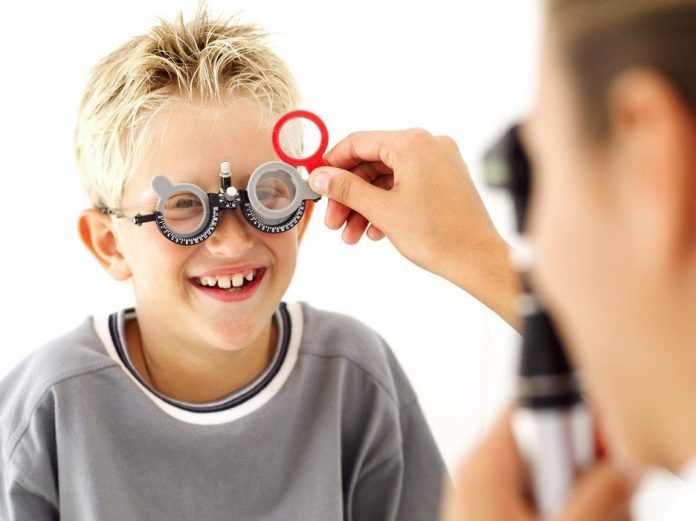Parents & teachers must suspect poor vision in a child who goes very close for watching television or makes spelling mistakes while copying things from the blackboard. All children around the age of 5 yrs. must be examined in detail even if there are no symptoms to suggest less vision. Many a times, refractive error is diagnosed during a routine eye test in school or when the child is brought for consultation for other reasons like infections / injury. So parents play a vital role in the eye care of children. Parents must have motivation, understanding and patience during the course of treatment to prevent amblyopia (lazy eye) from setting in.
- TV viewing – Television should be watched at a proper viewing distance of 3.5 meter or more in a well lit room. If you have spectacles with power, then use them while watching Television.
- Computer usage – the child should be encouraged to use it judiciously in order to reduce eye fatigue. Computer screen should be slightly lower than eye level. This allows complete blinking thereby reducing symptoms of dryness & eye fatigue. Children should consciously blink his / her eyes every 10-15 minutes & give rest to the eye at intervals by looking for 1 minute at a far point (outside the window) more than 20 feet (6 meters) distance every half an hour.
- Playing games on the mobile –use of mobile phones should be restricted because of the less form factor & the resolution.
- Lighting – one should have a light source behind or from the left side while studying. Reading in adequate natural sunlight is the best. Books should be held at about 14 inches distance.
- Diet – A normal balanced diet comprising of red and green leafy vegetables like spinach, carrots, beetroot & yellow fruits including mango & papaya which are rich in carotene (A precursor of vitamin A) should be prepared for the child.
- Protective eyewear – If the child takes active part in sports, then protective eyewear is recommended. Protective goggles are also recommended while swimming. They prevent red eye due to chlorine and reduce the risk of eye infection.
- Allergic conjunctivitis – is frequently seen in school age. Children should be discouraged from rubbing their eyes since it aggravates the allergic process. In addition, due vigilance has to be paid to eye hygiene. Children should not touch their eyes with dirty hands.
- Certain practices of application of kajal to newborns & washing eyes with rosewater should be discouraged.
- Toys – Discourage the use of toys with sharp & pointed edges for infants & toddlers as they can accidentally get injured.
- Taboos and jokes about spectacles– they should be discouraged. If your child needs glasses, he / she should be motivated to use them. In addition, very importantly, neighbors, friends and family members should be sensitized to the child’s need for glasses and they should be discouraged from making jokes and sympathetic sounds about glasses.
In a nutshell
- Don’t consider glasses (Spectacles) a stigma as they are very important to keep our eyes from functioning well, preventing lazy eyes and preventing or treating squint (crossed eye) in the same person.
- Even if you see well and your eyes seem fine, you should check them once a year. This will protect you from diseases, improve your quality of life and may extend your life expectancy too.
- Be responsible for yourself, your family’s and children’s eye health.
- Routine eye checkup is painless and noninvasive.
- Eyes are windows to your overall health and well-being.
- Thus eye checkup is far more than just vision correction with spectacles, contact lenses or lasers.
- EYES ARE LIKE MIRRORS WHICH REFLECT OUR BODY’S HEALTH.
Dr. Shreyas Palav, MBBS, DOMS, DNB, MNAMS
(Ophthalmologist)
Bahrain Specialist Hospital

